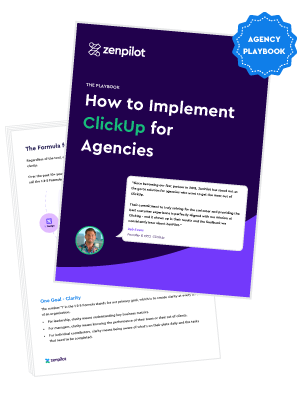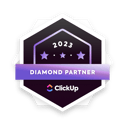How to Grow an Agency With a Smart YouTube Strategy, an Owner Mindset, and an Intentional Leadership Style (feat. Ali Schwanke)

“I have long seen myself as: I’m a very good marketer. I'm a very good communicator. I'm a good content creator. That's my lane. I know how to drive in that lane very, very well. And this has been a challenge for me to say: how do I become the best president, owner of a services business? Versus the best marketer anybody knows.”
Ali Schwanke is founder and CEO of Simple Strat—a Diamond HubSpot Solutions Partner and premium B2B content marketing agency.
You may know them from the HubSpot Hacks YouTube channel, the #1 unofficial source of HubSpot tutorials with over 20k subscribers to the channel.
This episode of Agency Journey is a perfect listen for agency operators looking to find their perfect niche; discover content topics and formats that work on YouTube; and become a better leader by leveraging their unique leadership style.
It’s also full of inspiration for owners considering making an exit from their agency.
Ali talked about:
💡 Simple Strat’s journey towards becoming experts in the HubSpot ecosystem through content creation and strategic focus
💡 How Ali and her team approach content production and finding ideas for their HubSpot Hacks channel on YouTube (leveraging TubeBuddy, AirTable, and HubSpot rep feedback)
💡 Moving from solving problems on her own to empowering team members to learn and grow
💡 Ali’s advice on leadership styles, the shift in mindset from a marketer to an agency owner, and the importance of systems and processes in scaling an agency
💡 Ali’s thoughts on how to prepare for a future exit from an agency, including the importance of mindset but also legal compliance, data preparation, and more
Resourced Mentioned:
📚 HubSpot Hacks YouTube channel
📚 TubeBuddy (for YouTube keyword research)
📚 "Work Less, Earn More" by Karl Sakas (book)
📚 "Built to Sell" by John Warrillow (book)
📚 "How to Win Client Business When You Don't Know What You're Doing" by Doug Fletcher (book)
📚 "Thinking, Fast and Slow" by Daniel Kahneman (book)
You can also scroll below for a collection of Ali's best quotes from the show!
About Ali's Agency (Simple Strat) and Its Pivot to HubSpot
Ali first briefly shared about her agency, who they serve and how.
"Think about yourself as a business owner or a maybe even a marketer that wants to do more with less. And HubSpot is a tool in order to do that.
We actually found ourselves creating content around it. And that's how we found our expertise and our niche.
But what that means today is if you are looking to get more out of a sales marketing automation platform and you want to use HubSpot, we are the experts on that.
We work with agencies; we work with people that are in marketing departments; we work with founders across multiple industries and nationwide."
Gray then inquired about Simple Strat's origin story. Did it start around HubSpot or did that come later?
"It's funny. There's multiple parts of our journey that I think, as any business owner or agency founder has said, 'this is going to be The Thing'.
And often the thing that you think is going to be The Thing never...
It [ends up being] some random thing in the corner.
And that's how we started.
When I first started the agency, I sat down on my kitchen table and I had this manifesto. I typed out all the things I believed to be true about marketing.
And ultimately what I centered around was strategy.
I saw a lot of people jumping into tactics and trying to find the silver bullet.
That hasn't gone away actually, probably getting worse.
But I want to be a strategy firm.
At that time, we needed of attach ourselves [for] credibility in the marketplace—and HubSpot partnership was a way to do that.
And we quickly learned that HubSpot partnership means you pay a bunch of money to get a badge—and you're just like everybody else.
So our expertise actually came from creating content around HubSpot, which meant we had to stay on top of it.
We then visibly looked like we knew what we were doing better.
And it's actually catapulted us to the front and center.
And we decided to stop doing anything else that's not HubSpot."
How Simple's Strat Top-Tier YouTube Channel, HubSpot Hacks, Was Born
In the HubSpot ecosystem, Simple Strat are really well known for the HubSpot Hacks YouTube channel—one of the top unofficial channels with HubSpot guides and education.
But how did that channel come to be? How did they know it could become a large part of their market presence?
When asked about the origins of the channel, Ali explained that the road there had quite a few twists and turns.
"The predecessor to that was us trying to run a local user group.
We ended up just really struggling to find our footprint in the user group ecosystem around us.
And a lot of DYI marketers [told us] 'thanks for the knowledge, but we don't need to hire you guys'."
YouTube was the next step after the user groups, but it wasn't focused on HubSpot at first.
"So when we went to YouTube...
My advice for anybody looking to emulate a content creator is go back as far as you can to try and find the stuff they first did.
And if you find the stuff that we first did, I mean... Our tags on YouTube were like 'Midwest' and 'marketing'.
Woohoo, good job, YouTube strategy.
So when we first started on YouTube, we were doing videos about just generic marketing stuff."
But then, Simple Strat had a client—a software company with a complicated product.
Ali strongly believed YouTube would be a great marketing channel for them.
When she faced pushback on the idea, Ali stubbornly decided to test it anyway for her own agency with HubSpot content.
"And so [we] put together a concept of just recording Loom videos and optimizing for better search on what people were saying online and how they searched.
It was a big point in time where everyone was actually searching for things like 'how to do X' in the words of the customer, not the superfluous jargon stuff.
So we did that with Loom videos and we started to see traction.
We decided to double down and actually make it a separate channel, invest in production and process.
And it took six months until it got us off the ground.
And then once we started being known as the quote unquote 'HubSpot people'...
Suddenly we released a video a week and everyone's like, 'whoa, where have you been?'"
YouTube Topic Research and Strategy: How HubSpot Hacks Identifies Great Content Ideas
How does a successful YouTube channel like HubSpot Hacks find new ideas for videos? What does keyword research and topic planning look like? Are there any specialized tools involved?
Ali shed some light on it on the podcast.
"We have a couple of things.
One of the things that helps us with our content calendar is we look at YouTube for a couple of different reasons.
One is definitely search traffic.
Two is efficiency of us helping our clients, period."
That's really smart—not just capturing new eyeballs via YouTube SEO, but also making sure that prospects in the pipeline and current clients find a lot of benefit and education from their YouTube content.
Ali immediately shared a specific example of how client interactions informed what they put on their YouTube channel.
"So Will on our team brought a topic up a while ago.
He says, 'every consultation I do these things called the five things you should do to set up your HubSpot portal.'
He's like, 'we go over them on the call.
I send them the recording on the call—but it really should just be a five minute video.'
So we shot that video, optimized it the best we could for search.
But the primary use case of that is after every single initial consultation, they get that video.
So we're dual-purposing it."
There are some tools involved though—one for finding keywords, and another one for storing ideas so they can capitalize on them later.
"We're using TubeBuddy to do some keyword research there.
We have an AirTable that anytime someone asks us, 'do you have a video about this?'
We've now been talking to HubSpot reps, like what do you wish you could send to your clients?
So we're trying to tap into—we call it the mothership."
Finally, what's happening on YouTube itself is a rich source of information and ideas to store in the "mothership" on AirTable.
"We're seeing what people are commenting on as far as comments on YouTube.
And then anything that our competition is ranking on that we don't have a good video for, we put that in there as well."
Transitioning From a Marketer Mindset to an Owner Mindset
Agencies are often started by brilliant marketers.
But to scale an agency and build a strong company, you need to grow out of the marketer mindset and start thinking like a business owner.
This transformation is something that Ali shared about on the pod.
"As a marketer turned agency owner, I have long seen myself as: I’m a very good marketer. I'm a very good communicator. I'm a good content creator. That's my lane. I know how to drive in that lane very, very well.
And so especially when you have skills like that and you don't come from—I was not a CMO of a giant company with a giant team, I'm not opposed to getting my hands dirty...
...that also comes with the risk of anytime something breaks down, I jump in and I do things.
And this has been a challenge for me to say: how do I become the best president, owner of a services business? Versus the best marketer anybody knows."
Recognizing the need to change is one thing, but what steps is Ali taking—and what resources is she leveraging—to gain the skills needed to succeed as an owner?
"I mean, this podcast [Agency Journey] has been an excellent resource for that.
Systems and processes, that's the name of the game.
I run my house like that.
I run my house so that my house hopefully doesn't need me when I'm not here.
My kids have lists. My dogs have schedules.
Even the bills and everything just runs on clockwork.
But when I look at the agency structure for me, it's how do I help level up team members?
Instead of looking at how do I solve the problem, it's how do I teach them how to solve the problem?
And even our HubSpot Hacks, we have a YouTube template that is used.
We have an editing team. We have a process. We have a 'how you record it'.
We have all these pieces now that if I were to step out for six months, that can continue without me."
There's an interesting emotional flipside to it though...
"I think sometimes your ego takes a hit there because it's like, 'oh, they don't need me anymore'.
But that's actually the best place to be.
Because my energy should be spent on innovation and ideas, and making sure that we're hitting our metrics.
And it shouldn't require me to jump in and try to save everything all the time."
On Her Agency's Long-Term Ambition, and the Issue of Whether to Sell
Where do you want to take your agency? Do you want to sell it someday, or are you building a lifestyle-type business?
Gray asked Ali about her long-term plans for Simple Strat, and whether she plans to sell one day.
In return, Ali shared a candid perspective on how her perception of the issue changed over time, and the timeline she's looking at to make a decision.
"If you would have asked me this when I first started the company...
I think anybody thinks that, 'oh, we're going to do this and I could work on this forever. It's so fun.'
Then you wake up one day and go, 'okay, I don't know if I want to do this forever. What do I want to do?'
We do talk a lot about saleable value and the ability for us to have options.
I don't want to entirely know what that looks like for me at the moment.
I do believe that for me, there needs to be some sort of transition of value at some point.
But I don't know if that's into a product, into a sale or private equity.
What I want to do right now is I want to build a brand large enough that allows people to:
do what they love,
have a good team environment,
make a considerable impact in the industry,
and ultimately change the scope of marketing and sales automation throughout that process."
Ali also shared her personal timeline. How much time is she giving herself to accomplish the long-term goals of Simple Strat?
"I do have one child left at home, so I'm giving myself about seven years (he's eleven) before I have to really make that [impact].
Seven years is a pretty good time to set yourself up for one of those things to happen."
She also shared about a book that strongly shaped her thinking around selling and the value of her company.
"So I finally listened to [Built to Sell].
I listened to the book twice.
And every single time I come back to that part in the book where he says, 'I'm ready to give up, I'm done'.
'This must have some sort of value'.
And he goes to his friend and his friend says it really doesn't.
And trying to look ahead and learn from other people's mistakes...
...you think you have so much equity worth something, but it's only worth it to you.
So what am I building that's worth something to somebody else?
And that does reframe your thinking quite a bit."
Ali's #1 Tip for Agency Operators: "Decide What Type of Leader You're Going to Be"
Ali's #1 tip for agency operators is all about leadership styles—recognizing, nurturing, and leveraging them properly.
"My number one tip for other agency owners would be...
Decide what type of leader you're going to be and understand what that means for your team.
And the reason I say that is I think when you...
...especially if you don't come into agency ownership necessarily as like, I went to school for leadership and entrepreneurship and all those things...
...you come, like [in the E-Myth Model], you come as a Technician.
You come with this understanding that everybody knows your skills and as much as you do.
And really you realize there's different types of leaders.
There's technical leaders, there's more charismatic leaders.
There's going to be people who have a lot of capital, so they're able to use a network.
For myself, I realized that I am a very idea- and people-driven person.
And what that means for my team is sometimes I overwhelm them.
And I need to understand how to ideate without spoiling the rhythm of our company.
So I've been privy to that thanks to some insights from my business partner and a coach.
But figure out what kind of leader you're going to be.
And then make sure you're getting coaching or insight or some sort of assistance to help you become that person."
Lead Your Agency to Success Using the 3 Keys to Gold-Standard Agency Ops
If you read this far, I'll dare to assume you're invested in the success of your agency.
In our experience providing operations consulting for 2,700+ agencies, we've found there are a few specific areas you need to take care of to stabilize, grow, and—if preferred—exit the agency.
We call them the 3 keys to gold-standard operations:
- Processes
- Tools
- Habits
And here's the TL;DR:
The best tool to serve as a comprehensive work management system for your agency is likely ClickUp—we've tested most of the other PM tools and ClickUp comes out on top.
As for the habits and processes you need to make sure your operations are watertight...
...we explain everything you need in ZenPilot's Guide to ClickUp for Agencies.
It's the optimal ClickUp system, distilled into an easy-to-follow how-to guide you can download for free.
Be sure to grab it to explore the system that can help your agency run like clockwork.
ClickUp will also allow you to finally build a clean database of time tracked per client and service line...
...which can allow you to build a very strong profitability & utilization dashboard.
Don't forget to subscribe to Agency Journey for more inspiring agency interviews.
I'll see you in the next one!




